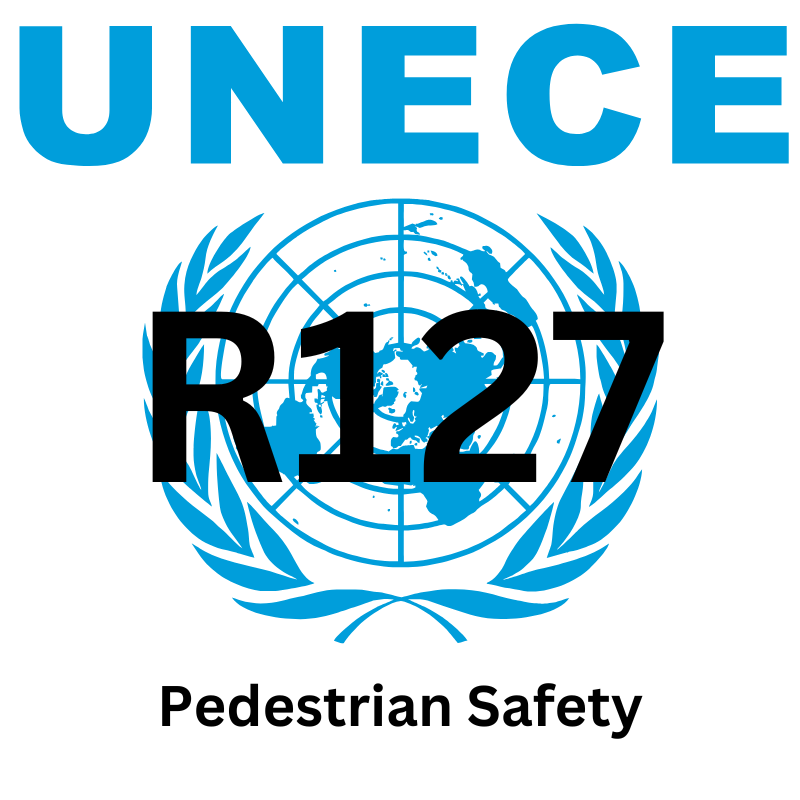Guide To: UNECE R127 - Pedestrian Safety
15 January 2025

UN ECE Regulation No. 127 outlines uniform provisions for the approval of motor vehicles regarding their pedestrian safety performance. The regulation's primary aim is to enhance the safety of vulnerable road users (VRUs), such as pedestrians, by reducing the severity of injuries in vehicle collisions. Below is an updated guide incorporating the latest amendments.
Scope of the Regulation
UN ECE R127 applies to:
- Motor vehicles in categories M1 (passenger vehicles) and N1 (light commercial vehicles).
- Specific exemptions apply to vehicles with particular configurations or weight classifications. For instance, vehicles with an Adjustable Ride Height Suspension System (ARHSS) have distinct provisions under the regulation.
Key Features of UN ECE R127
Pedestrian Impact Areas
- Bonnet top and leading edge: Critical zones for mitigating head injuries, particularly for adults and children.
- Bumper and lower legform impact areas: Focus on reducing knee and leg injuries during collisions.
- Windscreen and cowl areas: Newly included test areas for head impact assessments.
Testing and Performance Requirements
- Headform Impact Tests:
- The Head Injury Criterion (HIC) is used to evaluate head injury severity. Recent amendments specify a maximum HIC value of 1,000 for two-thirds of the bonnet and windscreen test areas. In other zones, the limit is 1,700.
- New procedures for measuring and defining the windscreen and cowl monitoring areas have been added.
- Legform Impact Tests:
- Tests are performed to minimize knee ligament elongation and tibia bending moments. Vehicles with ARHSS must meet these requirements across varying ride heights within specified speed ranges.
- Adjustable Ride Height Suspension Systems (ARHSS):
- ARHSS must automatically return to the normal ride height at speeds exceeding 25 km/h, with exceptions for low-speed off-road use. Testing includes numerical simulations and physical tests to demonstrate compliance.
Bonnet and Bumper Performance
- Updates clarify the geometric definitions of bonnet and bumper areas, such as the Bonnet Rear Reference Line (BRRL) and the Upper Bumper Reference Line (UBRL). Flexible tape measurements and new diagrammatic clarifications ensure consistency.
Wrap Around Distance (WAD)
- The regulation now includes additional provisions for WAD 2,500 to ensure comprehensive coverage of larger vehicle front structures.
Conformity of Production
- Manufacturers must demonstrate continued compliance through production checks. For vehicles with advanced systems like ARHSS, specific conditions must be verified and documented in technical manuals and owner handbooks.
Amendments Overview
Recent amendments to UN ECE R127 include:
Supplement 1 to the 03 Series (Effective June 2023):
- Introduced provisions for ARHSS and specified unique approval codes for vehicles with extended WAD boundaries.
Supplement 2 to the 03 Series (Effective January 2024):
- Expanded test areas for windscreen and cowl monitoring.
- Enhanced definitions and testing requirements for bonnet and bumper zones.
Supplement 1 to the 04 Series (Effective January 2024):
- Clarified testing protocols for vehicles with complex geometries.
- Introduced new diagrams for determining test area boundaries and open zones.
Conclusion
UN ECE Regulation 127 continues to evolve, integrating advanced safety measures and addressing emerging vehicle designs, such as those with adjustable ride height systems. By adhering to these standards, manufacturers contribute to reducing pedestrian injuries and fatalities, ensuring safer roads for all users.
Updated 15th January 2025